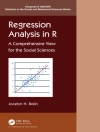Recipient of Choice Magazine′s 1991 Outstanding Academic Book Award Why do some individuals pursue crime as a lifestyle? After years of incarceration, why do these offenders habitually repeat criminal behavior? In The Criminal Lifestyle, Walters approaches the question of crime by examining how various biologic, sociologic, and psychologic factors interact to bring about criminal behavior. He extends the criminal career concept to include those persons who approach crime–not as an isolated incident–but as a lifelong commitment. Organized in the same manner as the study was conducted, this riveting book reviews and evaluates research, theoretical issues and practical considerations concerning crime, and develops a model of lifestyle criminality. In The Criminal Lifestyle Walters examines a variety of different perspectives, and organizes them into a framework which furthers our understanding of persons who approach crime as a lifestyle. As such, this contemporary study should be required reading in courses on psychology, criminology, and criminal justice. In addition, practitioners and policymakers who must make decisions about individual offenders will not want to pass up this distinctive resource. ‚This is an intriguing book that should have a wide audience both in criminology and in other fields. Upper-division undergraduates and above.‘ –Choice
Inhaltsverzeichnis
A Working Hypothesis
Criminological Theory
Crime as a Lifestyle
The Criminal Lifestyle
Postulates and Key Terms
The Criminal Lifestyle
Developmental Issues
The Criminal Lifestyle
Cognitive Patterns
The Criminal Lifestyle
Assessment and Change
The Working Hypothesis Revisited
Über den Autor
Glenn D. Walters received his Ph.D. at Texas Tech University in 1982 with a concentration in Counseling Psychology and a minor in Neuroscience. He is employed full-time as a psychologist in a correctional setting while also teaching courses, both graduate and undergraduate, as an Adjunct Professor at The Pennsylvania State University, Schuylkill, and Lehigh University. In addition to forensic psychology, he teaches abnormal psychology, psychological assessment, and developmental psychology. He has written two other books with SAGE: Drugs & Crime in Lifestyle Perspective (1994) and The Criminal Lifestyle: Patterns of Serious Criminal Conduct (1990). The present book is an outgrowth of the author′s experiences teaching criminology and forensic psychology and the realization that crime is better understood once students appreciate the context of criminal development and desistance.












